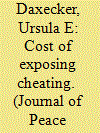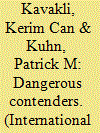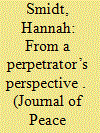|
|
|
Sort Order |
|
|
|
Items / Page
|
|
|
|
|
|
|
| Srl | Item |
| 1 |
ID:
117015


|
|
|
|
|
| Publication |
2012.
|
| Summary/Abstract |
This article investigates the relationship between international election observation, election fraud, and post-election violence. While international electoral missions could in principle mitigate the potential for violence by deterring election fraud, the ability of international observers to detect manipulation may in fact induce violent uprisings. Serious irregularities documented by international observers provide credible information on election quality, which draws attention to election outcomes and alleviates coordination problems faced by opposition parties and society. When elections are manipulated to deny citizens an opportunity for peaceful contestation and international observers publicize such manipulation, violent interactions between incumbents, opposition parties, and citizens can ensue. Consequently, the author expects that fraudulent elections monitored by international organizations will have an increased potential for subsequent violence. This expectation is evaluated empirically in an analysis of post-election conflict events for African elections in the 1997-2009 period. Using original data on electoral manipulation and reputable international election observation missions, findings show that the presence of election fraud and international observers increases the likelihood of post-election violence. Matching methods are employed to account for the possibility that international observers' decisions to monitor elections are endogenous to the occurrence of violence in the electoral process. Results for matched samples confirm the findings in the unmatched sample. A variety of robustness tests show that the results are not influenced by the operationalization of independent variables and influential observations.
|
|
|
|
|
|
|
|
|
|
|
|
|
|
|
|
| 2 |
ID:
171169


|
|
|
|
|
| Summary/Abstract |
How do international observers decide whether to criticize or condone electoral fraud in a country? We argue that this decision depends on the identity of the victims of electoral fraud. A monitoring organization is more likely to overlook fraud committed against groups that are deemed dangerous by its sponsor. Based on this insight, we hypothesize that in the post-Cold War era election monitors are more tolerant of fraud against Islamic challengers, especially when Islamic movements are perceived as a threat to political stability. In support of our hypothesis, we find that outside monitors are more likely to endorse an election in countries with an Islamic opposition party and an ongoing Islamist terrorist campaign. Furthermore, we find that the effect is driven by Western monitoring organizations and becomes stronger after the September 11 attacks. Our findings provide a simple yet powerful insight: the calculus of outside observers depends not only on who they wish to see in power, but also who they want to keep from power.
|
|
|
|
|
|
|
|
|
|
|
|
|
|
|
|
| 3 |
ID:
097630


|
|
|
|
|
| Publication |
2010.
|
| Summary/Abstract |
Randomized field experiments have gained attention within the social sciences and the field of democracy promotion as an influential tool for causal inference and a potentially powerful method of impact evaluation. With an eye toward facilitating field experimentation in democracy promotion, I present the first field-experimental study of international election monitoring, which should be of interest to both practitioners and academics. I discuss field experiments as a promising method for evaluating the effects of democracy assistance programs. Applied to the 2004 presidential elections in Indonesia, the random assignment of international election observers reveals that even though the election was widely regarded as democratic, the presence of observers had a measurable effect on votes cast for the incumbent candidate, indicating that such democracy assistance can influence election quality even in the absence of blatant election-day fraud.
|
|
|
|
|
|
|
|
|
|
|
|
|
|
|
|
| 4 |
ID:
144086


|
|
|
|
|
| Summary/Abstract |
Do international election observers deter or spur violence after election day? This article argues that only when conceptually and empirically distinguishing between violence by governments and opposition groups, can we assess the impact of international election observation. Disaggregating post-electoral violence uncovers that observers can deter governments from using force, but they have the opposite effect on opposition groups. When expecting criticism from observers, opposition leaders can easily deny their responsibility for violence by individual party militants, while weaponry and official insignia betray police and military involvement in violence and force the government to bear command responsibility. Governments also anticipate higher international costs for engaging in post-electoral violence than opposition groups, which are not usually targets of international punishment. On the other hand, international election observers unintentionally incite opposition groups to organize violence, as opposition groups seek to benefit from international attention and support that come with the presence of observers. Observers’ exposure of fraud reverses this differential effect: because governments expect international costs for election rigging anyway, observers cannot deter repression after highly fraudulent elections. But their alertness to electoral malpractice alleviates opposition groups’ incentives for post-electoral violence. Using data on 230 state-wide elections in Africa from 1990 to 2009, the analysis supports the observable implications of this argument. The findings of this article imply that international election observation missions make the post-electoral environment more peaceful when it comes to government repression after non-fraudulent elections. But observers ought to develop greater local expertise to identify opposition grievances before these groups resort to violence and be attentive to the possibility of increased repression after exposing cheating.
|
|
|
|
|
|
|
|
|
|
|
|
|
|
|
|
|
|
|
|
|